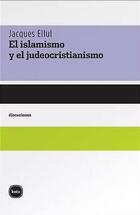An opponent of Marxism in the 1930s, persecuted by the Nazis during the occupation of France, declared 'righteous among the nations' for having saved Jewish families from Nazi deportation, a sharp critic of technical progress and one of the inspirers of ecological concern, Jacques Ellul – jurist, historian, theologian – was always distinguished by his radical non-conformism. The texts collected in this volume – 'which should be read as a testament', as Alain Besançon specifies in his prologue – are another example of Ellul's ability to construct a thought against the current of the commonplace. In them, Jacques Ellul makes an analysis that is as rich as it is polemical on the relations that, on the religious level, Islamism and Judeo-Christianity maintain. Starting from three principles that are supposed to certify the kinship between the two, he shows that this relationship is theolo...read more
All book titles by this author
|
Title |
Price | ||
|---|---|---|---|
|
|
Islamismo y el Judeocristianismo, El Author: Jacques Ellul Publisher: Katz |
$260.00 |
Shopping cart
Loading cart
Important notices
|
|
Recordando a André Rouillé: Su legado en la fotografía André Rouillé 1948 - 2025 |
|
|
Libros de filosofía y co. Disponibles en Librería Herder |
|
|
Revista Filosofía & Co. nº 9 Nueva revista de filosofia divulgativa y actualidad |
|
|
"Espacios de la filosofía" - Mauricio Beuchot - Novedad Herder México |
|
|
Revista Filosofía & Co. nº 8 Nueva revista de filosofia divulgativa y actualidad |
Pay safely with:


In the webshop
New
|
|
La profecía en la antigüedad 70531 $900.00 -0.00% $900.00 |
|
|
Simone Weil y la cuestión judía 70530 $470.00 -0.00% $470.00 |
|
|
Medios calientes 70159 $400.00 -0.00% $400.00 |
|
|
El bestiario de Michel Foucault 70404 $749.00 -15.00% $636.65 |
|
|
Cantan los ángeles, rugen los monstruos 69202 $510.00 -0.00% $510.00 |
In the press
Promotions
|
|
Panorama A1.1, Deutsch als Fremdsprache Übungsbuch 36726 $235.00 -35.00% $152.75 |
|
|
Diccionario de términos filológicos 70241 $900.00 -25.00% $675.00 |
|
|
Verbos conjugados $600.00 -25.00% $450.00 |
|
|
Prosa y poesía. Homenaje a Gonzalo Sobeja 70242 $1,755.00 -25.00% $1,316.25 |
|
|
Lingüística española aplicada a la terapia del lenguaje 70239 $300.00 -25.00% $225.00 |





